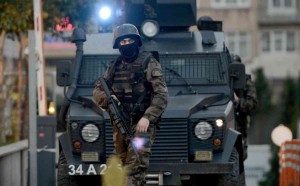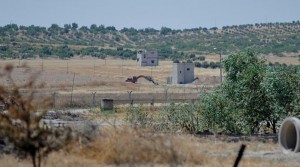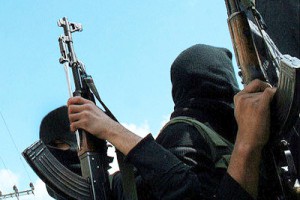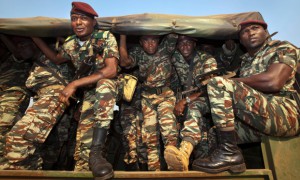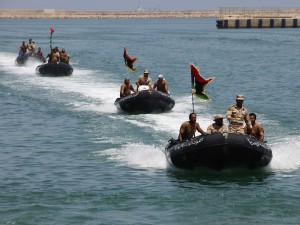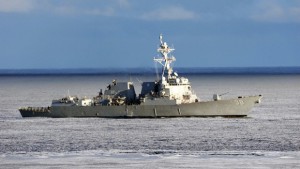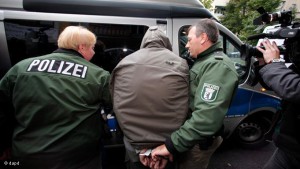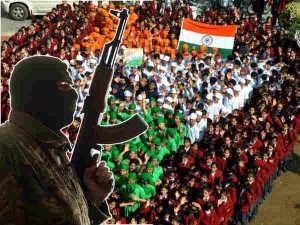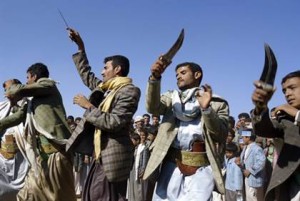Turkey arrests 21 suspected ISIS members
Turkey on Friday detained 21 suspected members of the Islamic State group, including three foreigners, in a major operation in several cities including Istanbul, state media said.
The suspects, who were arrested in pre-dawn raids, are suspected of helping the militant group recruit people from Europe, the official Anatolia news agency said.
Expecting assault from Syrian Kurds, ISIL digging in along Turkish border
Islamic State of Iraq and the Levant (ISIL) has begun digging three-meter-deep ditches on the Syrian side of the Jarabulus border crossing with Turkey, local sources said.
The sources, who are based in Turkey, told Anadolu Agency on Wednesday that their relatives in Syria had seen at least three heavy construction vehicles digging the ditches.
According to Turkish authorities, the ditches were being dug along the border in advance of an expected attack by Syrian-Kurdish People’s Protection Units (YPG), considered the military wing of the Syrian Democratic Union Party (PYD).
Syria’s Jarabulus region, which was captured by ISIL in the summer of last year, is located adjacent to the Turkish border.
The Turkish armed forces, meanwhile, have been monitoring ISIL’s military activities and stepping up security on the border.
On June 15, ISIL lost Tel Abyad – one of its major strongholds in Syria – to the Free Syrian Army and the YPG.
It was the first such territorial loss to be sustained by ISIL since the group captured vast swathes of territory in Iraq and Syria last year.
Terrorism threatens China, Russia and other regional countries
President Mohammad AShraf Ghani has warned that the terrorist groups have exceeded insurgency activities bثyond the borders of Afghanistan and threatens China, Russia and other regional countries.
Speaking during the BRICS summit in Ufa city of Russia, President Ghani said war and violence in Afghanistan also threatens system of governance and security of the region.
He also briefed the summit participants regarding the formation of groups such as the Islamic State of Iraq and Syria (ISIS), their financial sponsorship, recruitment and expansion of their activities.
President Ghani insisted on regional cooperation in a bid to eliminate threats posed by the terror groups in the region.
He also added that the regional countries should concentrate on development projects in a bid to improve the security situation.
In parts of his speech, President Ghani also assured that “Afghanistan is a center for regional cooperation, not a
battlefield of competitions.”
BRICS is comprised of Brazil, Russia, India, China and South Africa who have recently emerged as new economic power and have an effective influence over regional and global affairs by forming 34 percent of the global population and attains 30 percent of global GDP.
Cameroon says repulses Boko Haram attack, kills 3 militants
Cameroon’s army has repulsed an attack by Boko Haram and killed three of the Nigerian Islamist militants in heavy fighting in the Far North region of the country, a Cameroon government spokesperson said on Thursday.
The attack represented a change of tactics by the militants following a series of battlefield defeats this year in which they have lost territory to a regional force that comprises Nigeria, Niger, Chad and Cameroon, spokesperson Issa Tchiroma said.
“Early Tuesday morning around 03:40 an enemy column in four-wheel drive vehicles opened fire on positions held by our defence forces,” he said of the attack in Bodo town.
“There followed violent combat until dawn. Faced with the repost of our soldiers, the aggressors beat a retreat leaving behind three dead, a quantity of weapons and a lot of blood,” he said, adding that no government soldiers were hurt.
The militants are trying to “make their voice heard and prove that they continue to exist,” he said. Boko Haram rarely comments directly on military action and there was no independent confirmation of the battle.
Two military sources close to the fighting who declined to be identified said 18 militants were killed in the fighting.
The regional operation has reduced attacks in recent months but bombings in Nigeria suggest Boko Haram may be shifting its focus further south and west, towards the capital, Abuja.
Boko Haram has been trying to establish a state adhering to strict sharia law through an insurgency that began in 2009. It controlled an area larger than Belgium at the end of 2014 before the regional offensive began.
Libya’s recognized government warns tankers away from Ras Lanuf port
Libya’s recognized government warned its security forces would seize any tankers approaching the Ras Lanuf terminal without permission, saying any attempt to make oil deals with the rival government in Tripoli would be “piracy”.
The warning over Ras Lanuf illustrates how the OPEC country’s oil industry is caught up in a power struggle between the two rival governments.
Iran-flagged ship targets US Navy with laser
A US Navy ship and helicopter were repeatedly targeted by a laser device on board an Iranian-flagged merchant ship beginning on Sunday in the Gulf of Aden, according to a US defense official, CNN reported.
No US personnel were hurt or equipment damaged in the incidents which ended on Wednesday, the official said.
The bridge area of the USS Forrest Sherman and one of its helicopters were targeted, the official said.
The Navy is not certain exactly what the device was, or how powerful it was, but believes it was not of industrial or military grade quality since there was no damage. The incidents are viewed at this point as harassment from the Iranians.
The incidents took place in international waters off the coast of Yemen. The Navy ship was “conducting routine maritime operations,” the official said. But it is well understood that U.S Navy warships patrol the region looking for any indication of Iranian weapons smuggling into Yemen.
Germany charges 4 with supporting Islamic State group
German prosecutors say they have charged four men with supporting the Islamic State group, one of them by helping smuggle would-be members to Syria.
Federal prosecutors said Thursday that they filed charges of supporting a foreign terrorist organization against a Tunisian citizen identified only as Kemal Ben Yahia S. in line with German privacy rules; a Russian national, Yusup G., and two German-Moroccans, Mounir R. and Azzedine Ait H.
The Tunisian is accused of organizing travel to Syria for potential IS recruits on several occasions between July 2013 and October 2014, including for a 17-year-old boy. Prosecutors also allege that he supplied the group with nearly 5,000 euros ($5,500) in cash as well as clothing.
The other three suspects are accused of helping Kemal Ben Yahia S. in his activities.
Al-Qaeda, Islamic State and India: the emerging threat
In the last decade or so, terrorism has evolved in unimaginable ways. There was a brief moment when everyone heaved a sigh of relief with the killing of Osama bin Laden. Most of the world thought Al-Qaeda was now history. It would be the end of global terrorism.
A little over five years after the dramatic killing of the Al-Qaeda chief, the group remains a potent threat to the world while a new far more vicious and brutal terrorist machine, the ISIS, now functions in most of the Middle East. At first ISIS, nurtured by the Saudis and Qatar, was thought to be a local Syria-Iraq territorial threat, meant to deal with the growing Iranian influence. Recent violent events have indicated that the ISIS has dramatically stepped up its campaign in Saudi Arabia, Egypt, Libya and Tunisia challenging the Al-Qaeda in these regions.
Terrorism thus remains as much of a strategic threat as it was in 2001. Today more states are affected by terrorist activities; more states are directly or indirectly involved in supporting or sustaining terrorist activities. There are more terrorists, more capable terrorist groups and the threat itself has become multi-dimensional. Needless to say, the task of tackling this menace has become even more difficult than the past for counter-terror agencies and for governments.
State sponsorship of international terrorism was first invoked as a strategic weapon to defeat a strong opponent through asymmetric warfare in the 1990s in Afghanistan. It has become fashionable since then as a force equaliser in some cases (against India) or force multiplier against others (in the Arab world).
The world today is witnessing the rise and expansion of a radical totalitarian ideology which inspires the Al-Qaeda, ISIS, Hezbollah, Hamas, Jabhat al-Nusra, Hizb ut-Tahrir, Lashkar-e-Tayyeba, Jaish-e-Mohammed, Harkat-ul-Jihad-Islami, the Taliban, Tehrik-e-Taliban Pakistan, Lashkar-e-Jhangvi (Ahle Sunnat Wal Jamaat) and scores of others. These groups do not operate in splendid isolation nor does the rest of the population remain immune from their activities. There are reports of co-operation amongst these groups from time to time. Over time and out of fear or conviction, there is interaction between the population that hosts them or where these radicals live. It is much worse or more insidious when the state intervenes in support of such elements.
Meanwhile, the West Asian regimes are more concerned with what Iran might do rather than what the ISIS is actually doing to them. This is the kind of attitude that will make countering terror all the more difficult.
It is obvious to all of us that the Muslim world is in ferment. It is true also that the majority is opposed to the violence and the tenets these terrorists follow. In a study by the US Congressional Research Service, only three percent of the Muslims understand Islam in militant terms. But if there are 1.6 billion Muslims today, this three percent still makes it 48 million who believe in religious intolerance who wish to overwhelm the opposition through unmitigated violence. Not a happy or comforting thought.
There are two epicentres of terrorism today. One is in the AfPak region, a byproduct of the Cold War, from where terrorism has long flown in all directions reaching as far as the United States and Europe. While the ‘global war on terror’ may have subdued some aspects of this, it remains very much an epicentre of terrorism.
Another epicentre which has risen in the recent times is in West Asia, which in some ways represents the first post-Cold War conflict between various competing forces. This turmoil affects both the West and us in India in more ways than one.
The main characteristics of today’s terrorism are –
Terrorist ideology is finding more acceptance among more people and communities than say a decade ago. Religious extremism, both in word and practice, is seeping into otherwise liberal societies across the world.
Terrorists today hold more territory than in the past-in Syria, Iraq Somalia, Nigeria, Pakistan and Afghanistan.
More states are disintegrating (Iraq, Libya, Yemen, possibly Syria in the near future) or are in the perpetual state of flux (like Nigeria, Pakistan and Afghanistan, and even Bangladesh and Myanmar), while others like Maldives and parts of Africa are increasingly getting affected.
Terrorists and volunteers from Europe and elsewhere in disturbingly large numbers have been going to the Zone of Conflict in West Asia.
Existing threats to South Asia and to India
South Asia faces a terrorist threat that has never been greater even though for the present it may seem at a low ebb with West Asia and Africa taking centre stage. Nevertheless, the subcontinent, home to over one-third of humanity, mostly poor, has more terrorist groups and terrorists than any other part of the world. Over the last thirty years, more lives have been lost to terrorist attacks here than anywhere else in the world.
Countries in the region like Afghanistan, Pakistan and Maldives face serious existential threats from a mix of terrorist groups active in the region and elsewhere. India has its share of terrorist activist attacks here than anywhere else in the world. Pakistan and parts of Afghanistan remain an ‘epicentre’ of transnational terrorism for decades and Pakistan’s attitude towards India has shown no change. It has long believed in what it thought was a smart and a financially sound policy of encouraging asymmetric war against bigger India through expendable jihadis that tied down the mighty Indian Army.
Al-Qaeda and ISIS
A significant part of recent terrorist violence can be attributed to Al-Qaeda and ISIS and their allies. It is not a secret that the threat from Al-Qaeda to the region, and the world, is far from over. Today, not only is Al-Qaeda alive, so are the Taliban, Haqqani Networks harboured in Pakistan and the Lashkar-e-Tayyeba and Lashkar-e-Jhangvi supported by the Pakistani state, and all of whom have cooperated and helped the Al-Qaeda in the past.
One does not see any reason for this to have changed in the past few years or hope that this will change in the future. In fact, the situation is expected to get much worse, should the ISIS find a foothold inside Afghanistan and Pakistan. There are increasing indications that this indeed might be so.
The Al-Qaeda was certainly militarily degraded post 9/11. The killing of Osama on May 2, 2011, was presumed to be the end of Al-Qaeda. This has turned out to be a false hope. Al-Qaeda has regrouped, changed its method of operations; it has also reinvented itself in the subsequent years, choosing to play a more advisory role rather than running the operation on its own.
The Al-Qaeda core today survives on franchise and its brand equity and remains a force in its original home in AfPak border area. In West Asia, it had found new ways of working with affiliates in the Arab Peninsula (AQIP), the Maghreb (AQIM) and in Syria and Iraq through Jabhat al-Nusra.
Statistics show that the threat from Al-Qaeda is far from over. For instance, in 2012, over 5000 persons were killed in various terrorist attacks in the world, most of them were carried out by Al-Qaeda affiliates in West Asia and Afghanistan.
Al-Qaeda showed its resilience when in September 2014 it set up a new chapter for the Indian Subcontinent (AQIS). Al-Qaeda chief Ayman al-Zawahari, in his statement, in 2012 announced that the group would be used for worldwide recruitment and operations.
However, the sudden and spectacular rise of the ISIS as a rival to Al-Qaeda, their brutal efficiency and zeal have led to some analysts seek more answers about their rise and generous financial and material support beyond that which has come from the Saudis, Qataris and Turks. The recent massive attacks by ISIS in Tunisia, Egypt, Syria Iraq and the bombing in a Saudi mosque confirm their presence, local support and ability in these regions and an attitude of defiance and arrogance towards the local authorities. Often they descended to levels of depravity and violence that has been unheard of for decades.
There are many unanswered questions about the sudden and spectacular rise of ISIS. It seems to be part of shock and awe, reaction to what the Americans have attempted in keeping with their policy of control of the region, where OPEC versus US commercial strategic interests, CENTCOM forces with 20 bases in six countries in the region and now Islamic versus Christian interests overlap.
Today, the ISIS has its wilayats in Libya, Algeria, Sinai, Saudi Arabia and Yemen. It has a presence in the Khorasan province of Afghanistan (although knowledgeable Afghans deny this vehemently) and support from breakaway factions of the TTP in Pakistan. Its soldiers look more like special forces troops than guerrilla fighters; ISIS is financially well-endowed with funds coming in from local powers as well.
India needs to be watchful not fearful
Terrorism in West Asia can essentially impact on India in three ways – continued use of its existing terrorist assets under a nuclear umbrella by Pakistan against India; radicalisation of the Indian Muslim youth; and attempts by ISIS and Al-Qaeda acting separately and in competition to expand their influence in India and other parts. So far, we have not seen any radicalisation among the youth in India barring a few examples but this need to be watched even though the Indian Muslim is by far the most moderate as a category in the region and does not get swayed by events outside the country. While there is no denying that Muslim radicals the world over are on an overdrive to recruit, it is possible some Indians here or in the Gulf may succumb in this age of the Internet. So far, there has been no such exodus but the intelligence and security agencies would remain concerned.
Radicalisation through the Internet and the social media where all these terrorist organisations run many highly active very professional websites and innumerable social media and Facebook accounts is a growing problem for all counter-terrorists organisations. The indoctrination techniques are persuasive and professional. It is impossible to put up a virtual wall against these inroads.
The Indian authorities would remain more concerned with the activities of Pakistan-based terror groups some of whom have links with Saudi Arabia and have also associate offices/branches in the Gulf. Our perceived and recent closeness to the US and Israel is bound to attract notice among the Islamists but this is something the country has to be prepared for.
The real threat we face is from all terror groups that have their bases in Pakistan. This means chiefly LeT, JeM or in Afghanistan from the Haqqanis. It is these groups fired by the rhetoric of the likes of Hafiz Saeed or Munawar Hasan, backed to the hilt by the Pakistan Army operating from safe havens in Pakistan that will remain the real threat.
The ISIS has no known operational base in Pakistan although there are stray reports about its presence. It can only operate in India if it has local logistic support both in Pakistan and India. It would suit Pakistan to let it be believed that the ISIS/AQ are responsible for these attacks as this absolves their own organisations of charge of terror in India. The ISIS and/or Al-Qaeda will become a real threat to us only if they have the same kind of back up from the Pakistan Army.
The views expressed in the above article are that of Mr. Vikram Sood, former Secretary R&AW, Government of India, and currently an advisor to the New Delhi-based Observer Research Foundation.
Temporary ceasefire in Yemen to begin from friday night until the end of Ramadan
Yemen’s warring factions on Thursday agreed to a temporary humanitarian ceasefire set to begin on Friday night, United Nations envoy Ismail Ould Cheikh Ahmed said, according to Reuters.
The pause in the fighting will last about a week until the end of the Muslim holy month of Ramadan, with the goal of allowing the delivery of assistance to some of the 21 million Yemenis in need.
The UN has worked intensively to broker a ceasefire to halt more than three months of fighting inside the country and Saudi-led air strikes against the Houthi rebels.
“For the humanitarian pause, we are going to start tomorrow evening and we have assurances from all the parties, and we are quite optimistic it will be respected,” Ould Cheikh Ahmed told Reuters by phone from Ethiopia, after finishing discussions in the Houthi-held Yemeni capital Sanaa.
“We have agreed to go ahead, based on two major points. The first is the commitment of all parties not to violate this ceasefire, this humanitarian pause. The second is that humanitarian assistance can reach all parts of Yemen,” he added.
Yemen’s president Abed Rabbo Mansour Hadi, who is in exile in Saudi Arabia, has asked the UN for “guarantees” to help the truce succeed, which include prisoner releases by the Houthis and withdrawals from vast areas where it is battling local fighters, according to Reuters.
A Saudi Arabian-led alliance began launching airstrikes on the Iranian-backed Houthi rebels on March 26. The airstrikes are aimed at restoring Hadi, who was forced to flee to Saudi Arabia after the rebels seized the capital, Sanaa, in September.
It is believed Iran is planning to use the Houthis to take over Yemen and seize the key strategic port of Aden, which controls the entrance to the Red Sea and ultimately to the Israeli resort city of Eilat.
Last month Yemen’s exiled government and the Houthi rebels failed to agree on a temporary ceasefire during UN-brokered talks.
The Houthis, for their part, had called for a temporary ceasefire, but the government rejected it, saying the rebels had used a previous humanitarian pause to grab more land.

